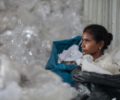China increasing its plastics recycling scrutiny
China increasing its plastics recycling scrutiny
<![CDATA[
Government officials in Guangdong Province in southern China took part in “vigorous crackdowns in December 2016 of small recycling factories and warehouses that were not operating with proper recycling [permits],” according to Dr. Steve Wong of Hong Kong-based Fukutomi Company Limited.
Wong, who is executive president of the China Scrap Plastic Association (CSPA) and a member of two Bureau of International Recycling (BIR) committees, reported the enforcement activities in write-ups he prepared in January 2017 for the BIR and media outlets.
“While China is determined to improve its ecological condition, unrelenting regulatory controls of the plastics recycling industry continued to prevail,” writes Wong. “The ultimate objective to get rid of small recyclers without proper recycling facilities and to stop the importing and recycling of ‘polluting’ scrap is getting more apparent.” Electronic scrap remains a focus of scrutiny, both in Guangdong Province and nearby Hong Kong.
Measures taken by enforcement officers in Guangdong Province included “seizing factories, arresting owners, disconnecting utility supplies and destroying ‘illegal’ workshops,” writes Wong. “The crackdown exercise was considered the largest ever in terms of scale and scope, which might become a ‘new normal in China,” he adds.
The enforcement will not shut down the entire industry, according to Wong. “Recyclers with direct source scrap suppliers, processing facilities that meet compliance standards [and] with high efficiency and capacity and direct customers are going to win,” he predicts.
Just south of Guangdong Province, in Hong Kong, “New legislation made in 2016 will become effective on 1 July, 2017, placing restrictions on the importing and processing of electrical and electronic scrap for everyone except license holders,” according to Wong.
Currently, there is only one license holder in Hong Kong, says Wong: Germany-based ALBA Group, which is reportedly investing HKD$1.7 billion ($212 million) in an electronics disassembly and shredding plant it is building in Hong Kong with an annual processing capacity of 30,000 tons.
Wong is skeptical of the arrangement, saying “the legislation lack[ed] consultation of industry players in Hong Kong” and may have been “prompted by the allegation of importing [obsolete electronics] for landfills in Hong Kong [that] has no factual basis.”
He continues, “It is controversial as to why there should be new legislation for restricting imports of e-waste strictly to licensed enterprises when the existing Waste Disposal Ordinance of Hong Kong, which ties in with the Basel Convention for which Hong Kong is a signing party, allows free trade and recycling of non-hazardous [scrap] in Hong Kong. Secondly, the absence of proper consultation with relevant industry association[s] in Hong Kong opened up [the new arrangement] for criticism, as many enterprises will find it hard to survive without proper alternative arrangements.”
Plastic scrap processed from electrical and electronic scrap is “not hazardous, but rather useful raw materials for the manufacturing industry,” writes Wong. “But this is being ignored in Hong Kong, and new legislation inconsistent with the joint practices of China and the European Union will become effective by July 2017. Action is necessary to redress the dilemma which the industry in Hong Kong will be facing,” he comments.
]]>
Source: Recycling Today
China increasing its plastics recycling scrutiny
<![CDATA[Government officials in Guangdong Province in southern China took part in “vigorous crackdowns in December 2016 of small recycling factories and warehouses that were not operating with proper recycling [permits],” according to Dr. Steve Wong of Hong Kong-based Fukutomi Company Limited. Wong, who is executive president of the China Scrap Plastic Association (CSPA) and a member of two Bureau of International Recycling (BIR) committees, reported the enforcement activities in write-ups he prepared in January 2017 for the BIR and media outlets. “While China is determined to improve its ecological condition, unrelenting regulatory controls of the plastics recycling industry continued to prevail,” writes Wong. “The ultimate objective to get rid of small recyclers without proper recycling facilities and to stop the importing and recycling of ‘polluting’ scrap is getting more apparent.” Electronic scrap remains a focus of scrutiny, both in Guangdong Province and nearby Hong Kong. Measures taken by enforcement officers in Guangdong Province included “seizing factories, arresting owners, disconnecting utility supplies and destroying ‘illegal’ workshops,” writes Wong. “The crackdown exercise was considered the largest ever in terms of scale and scope, which might become a ‘new normal in China,” he adds. The enforcement will not shut down…

